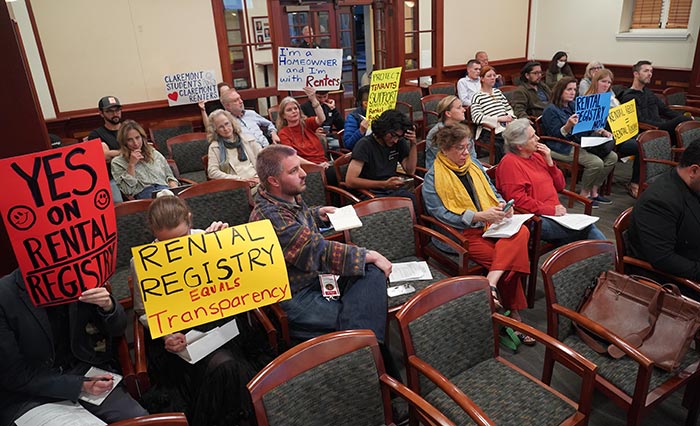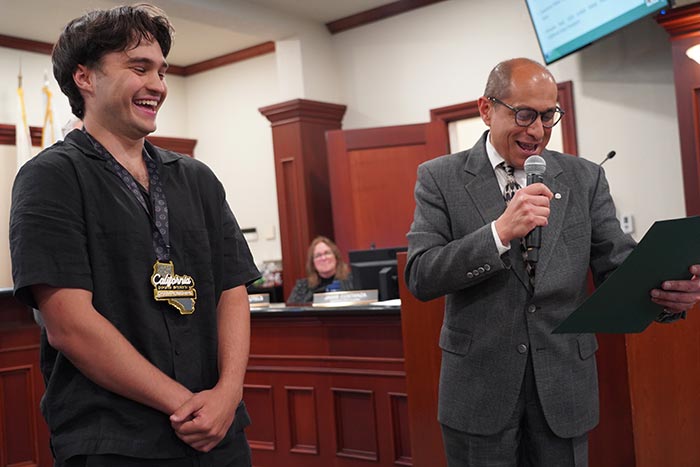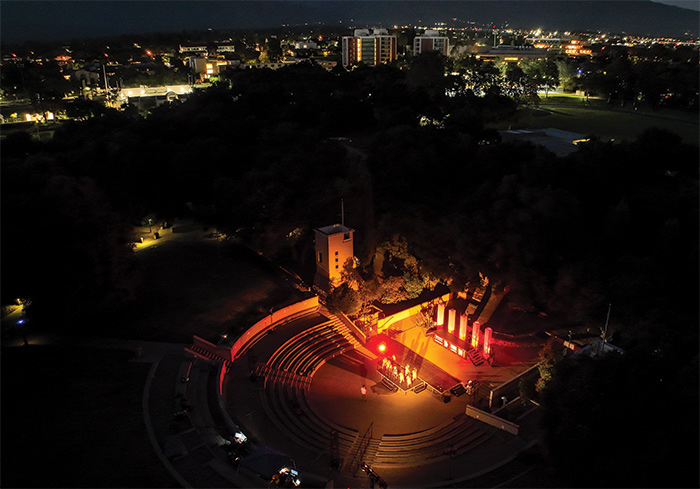City Council report: Claremont to allow short-term rentals

Tenants and landlords at the May 13 council meeting. Courier photo/Andrew Alonzo
by Andrew Alonzo | aalonzo@claremont-courier.com
Claremont City Council passed an ordinance reversing the city’s long-time ban on short-term rental properties at its May 13 meeting, and discussed key tenant and landlord protections.
Short-term rentals
The second reading of a temporary ordinance to allow short-term rentals in the city passed 4-1, with Council member Jed Leano opposed. The ordinance goes into effect June 12 and sunsets in a year.
The fundamental function of the ordinance — to regulate privately owned residential dwellings used as short-term rentals, to collect transient occupancy taxes, and “minimize the potential adverse effects of short-term rentals on surrounding residential neighborhoods,” according to the staff report — remains the same from the Courier’s previous reporting on May 9. Property owners who don’t attain proper permits or follow the ordinance are subject to fines and operation penalties.

(L-R) Claremont Police Department officer Jailer Jorge Aguinigua, Sgt. Jeff Ting, reserve officer Scott Mena, officer Tristan Vargas, and Capt. Robert Ewing, were recognized by the Claremont City Council as members of the San Gabriel Valley Elite team that took second in the 500-invitational category at this year’s Baker to Vegas Challenge Cup Relay, a 120-mile footrace from Baker, California to Las Vegas. The team finished in 16 hours and 7 minutes. Courier photo/Andrew Alonzo
The ordinance would bring a number of changes to the city’s municipal code, including:
- defining a short-term rental as “a privately-owned residential dwelling, or portion thereof, unless otherwise prohibited, that is offered or provided to a guest by an owner for less than 30 consecutive days.” It would not include hotels, motels, inns, or bed and breakfasts.
- compelling those offering short-term rentals to obtain a permit before listing a property on a short-term rental website. Permits would cost $585, with a $435 annual renewal fee, both of which include an inspection fee. Should a dwelling fail inspection, a $95 re-inspection fee would apply.
- barring landlords from evicting tenants or terminating a lease for the purpose of converting a rental unit to a short-term rental.
- prohibiting the use of a short-term rental property for commercial and/or social events.
- limiting overnight occupancy to a maximum of eight.
- compelling operators to provide overnight, on-site parking for one vehicle per bedroom.
The council made changes to the ordinance at the second reading on May 13, including:
- redefining “vacation rental zone” as “short-term rental zone,” a city recognized area eligible for short-term rental permits.
- striking language defining “vacation rental zone percentage” and “vacation rental zone percentage cap,” instead defining “short-term rental zone cap,” which caps the number of short-term rental permits that can be issued in a short-term rental zone to 20 per city district, per the ordinance.
- codifying short-term rental permits will only be issued to single-family dwellings as opposed to “vacation rentals,” “limited vacation rentals,” or “home sharing rentals.” Per the ordinance, a “single-family dwelling shall mean a residential unit designed and intended for occupancy by one household, which may be located in a standalone structure or within a development where each unit is independently owned.” It includes detached homes and detached or attached condominiums. Multi-unit buildings with over two dwelling units under single property ownership or with shared access corridors are excluded.
- updating the definition of “home sharing rental” to mean an activity whereby, for compensation, an owner hosts guests in his or her primary residence, an eligible accessory dwelling unit, or a habitable structure that is detached from the owner’s primary residence (such as a guest house) for periods of less than 30 consecutive days, while the owner lives on-site in the home or in the accessory dwelling unit throughout the guest’s stay.
Tenant protections
By a 3-2 vote, the council rejected a measure to direct city staff to explore the implementation of a rental registry, a database of rental properties that includes landlord and tenant information. It also introduced a first reading of an updated ordinance prohibiting harassment of tenants and landlords in rental housing, which passed 4-1 with Mayor Corey Calaycay voting no.

(L-R) Claremont resident Brandon Deal was recognized by Mayor Corey Calaycay at the May 13 City Council meeting for his recent state title at the United States Powerlifting Association’s Tested California MEGA State Championships. Courier photo/Andrew Alonzo
The council previously discussed tenant protection measures on February 11, when member Ed Reece recused himself due to a conflict of interest as a landlord, leading to a 2-2 deadlock on exploring the possibility of a rental registry.
After seeking guidance from the state’s Fair Political Practices Commission, Reece was able to remain at the dais last week as long as the tenant protection measures being considered applied to all residential rental properties in Claremont. Reece would eventually join Calaycay and Council member Sal Medina in rejecting the rental registry question.
Reece said a registry would impose significant administrative burdens and costs for the city, landlords, and tenants; discourage people from becoming housing providers as the registration process may be deemed too intrusive; and lead to landlord’s and tenant’s invasion of privacy as the city-collected data would be subject to the California Public Record Act.
“With the Public Record Act, once we have collected information and data, we have, as a public agency, a lot less ability to protect its confidentiality,” City Attorney Alisha Patterson said. “If we don’t have the information, landlords and tenants can keep it confidential, but once it’s gathered and owned by a public entity, it becomes much harder for us to protect that information.”
Medina said establishing a rental registry could deter mom-and-pop landlords from joining. Reece and Calaycay also said existing state laws — for example, Assembly Bill 1482 which caps annual rent increases — address concerns raised by tenants and landlords.
“Additionally, the $220,000 a year to collect data seems like it could be better used to potentially offering direct rental assistance that will have an immediate and substantial impact on keeping people in their homes,” Reece said.
Vice Mayor Jennifer Stark and Leano supported looking into creating the registry.
“I don’t see how we can be making sound housing decisions without collecting the data,” Stark said.
Critics have said rental registries can lead to rent stabilization and control. Leano contested that argument, citing the 1995 Costa-Hawkins Rental Housing Act.
“Costa-Hawkins is the law in the state of California, and Costa-Hawkins prevents implementing rent stabilization on any new rental unit that was built after a certain threshold date,” Leano said.
Both advocates and skeptics voiced their concerns during public comment.
Calls to establish a registry have increased since the council added exploring the feasibility of one to its 2024-26 priorities and objectives list last year.
Deputy City Manager Katie Wand read a revised proposed anti-harassment tenant/landlord ordinance that had been updated after input after a first reading on February 11. The changes include:
- added prohibited harassment definitions such as tenant-on-tenant, tenant-on-landlord, and landlord-on-tenant.
- new language barring landlords and tenants from disclosing or weaponizing a tenant’s or landlord’s immigration or citizenship status.
- new language clarifying that if a tenant or landlord prevails in court, the losing party will be responsible for paying “reasonable attorney’s fees and costs.”
- directing landlords to endeavor to plan maintenance times that accommodate tenants’ schedules, with a four-hour work limit unless additional time is warranted.
A second reading of the proposed ordinance will come at a future meeting.
Parks and recreation
Claremont Community Services Director Jeremy Swan delivered an overview of the city’s recently drafted Park Facilities Improvement Plan, an assessment of parks and facilities, priority projects, funding sources for potential improvements, and future public engagement processes. The improvement projects would cost about $9.1 million over 10 years.
The plan is linked in the May 13 agenda as item 10 at portal.laserfiche.com.
The next meeting of the Claremont City Council is 6:30 p.m. Tuesday, May 27, at council chambers, 225 W. Second St.
Previous meeting video is at claremontca.gov, hover over “government” and select “watch a meeting.”








0 Comments